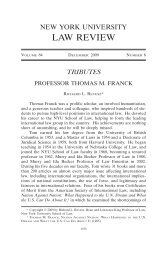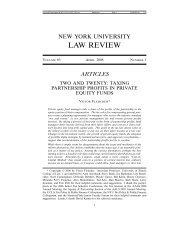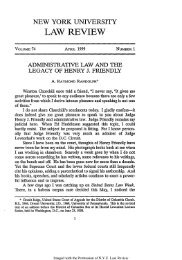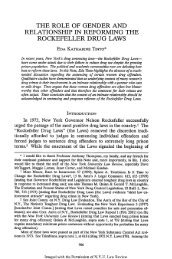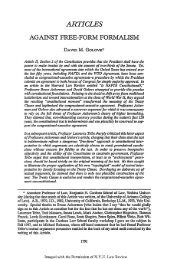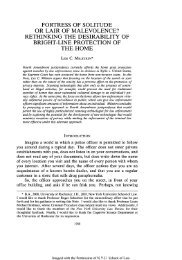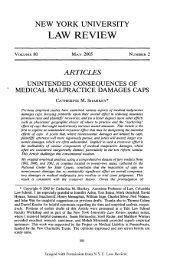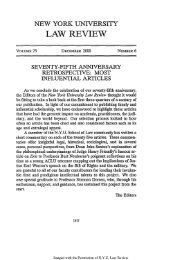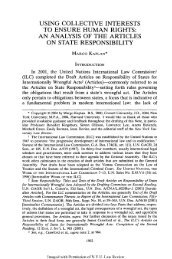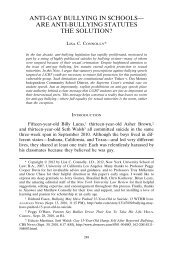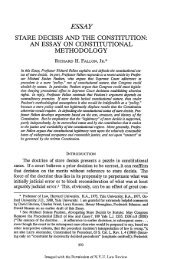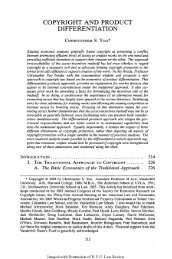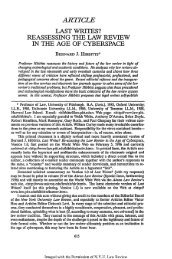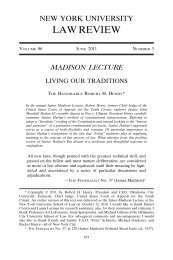Immigrants and the Right to Petition - NYU Law Review
Immigrants and the Right to Petition - NYU Law Review
Immigrants and the Right to Petition - NYU Law Review
You also want an ePaper? Increase the reach of your titles
YUMPU automatically turns print PDFs into web optimized ePapers that Google loves.
Imaged with <strong>the</strong> Permission of N.Y.U. School of <strong>Law</strong><br />
NEW YORK UNIVERSITY LAW REVIEW<br />
[Vol. 78:667<br />
First Congress established procedures for <strong>the</strong> receipt <strong>and</strong> consideration<br />
of petitions. 172 Notably, <strong>the</strong> rules adopted by <strong>the</strong> House 173 <strong>and</strong><br />
Senate 174 in <strong>the</strong> First Congress contained no alienage classification or<br />
o<strong>the</strong>r limitations on <strong>the</strong> capacity of noncitizens <strong>to</strong> petition. 175<br />
There was a significant amount of federal petitioning in <strong>the</strong> first<br />
years of <strong>the</strong> nation, much of which related <strong>to</strong> war claims 176 or commerce.<br />
77 The First Congress alone received more than six hundred<br />
petitions, 178 some of which led <strong>to</strong> <strong>the</strong> enactment of "private bills" 179<br />
pursuant <strong>to</strong> a legislative authority unders<strong>to</strong>od as linked <strong>to</strong> <strong>the</strong> people's<br />
right <strong>to</strong> petition. 18 1 ° The majority of petitions were addressed <strong>to</strong> <strong>the</strong><br />
House, as <strong>the</strong> chamber designated <strong>to</strong> originate appropriations legisla-<br />
172 The House reached quorum on April 1, 1.789 <strong>and</strong> adopted rules for <strong>the</strong> acceptance of<br />
petitions six days later. 1 H. Journal, ist Cong., 1st. Sess. 6, 10 (1789); see 8 Documentary<br />
His<strong>to</strong>ry, supra note 104, at xvi-xviii (summarizing early House practice under April 7, 1789<br />
rules of procedure). The Senate achieved a quorum on April 6, 1789 <strong>and</strong> on April 18<br />
adopted a st<strong>and</strong>ing order governing petitions. S. Journal, 1st Cong., 1st Sess. 7, 14 (1789).<br />
173 On April 7, 1789, <strong>the</strong> House resolved:<br />
<strong>Petition</strong>s, memorials, <strong>and</strong> o<strong>the</strong>r papers addressed <strong>to</strong> <strong>the</strong> House, shall be<br />
presented through <strong>the</strong> Speaker, or by a member in his place, <strong>and</strong> shall not be<br />
debated or decided on <strong>the</strong> day of <strong>the</strong>ir first being read, unless where <strong>the</strong> House<br />
shall direct o<strong>the</strong>rwise; but shall lie on <strong>the</strong> table <strong>to</strong> be taken up in <strong>the</strong> order <strong>the</strong>y<br />
were read.<br />
1 H. Journal at 10 (1789).<br />
174 On April 18, 1789, <strong>the</strong> Senate resolved: "Before any petition or memorial, addressed<br />
<strong>to</strong> <strong>the</strong> Senate, shall be received <strong>and</strong> read at <strong>the</strong> table, whe<strong>the</strong>r <strong>the</strong> same shall be introduced<br />
by <strong>the</strong> President, or a member, a brief statement of <strong>the</strong> contents of <strong>the</strong> petition or memorial<br />
shall verbally be made by <strong>the</strong> introducer." S. Journal, supra note 172, at 14.<br />
175 See 8 Documentary His<strong>to</strong>ry, supra note 104, at xvi-xvii (discussing early petitioning<br />
procedures).<br />
176 See Marc D. Yacker, Private Bills <strong>and</strong> Federal Charters 4 (Cong. Research Serv.<br />
Rep. No. 79-110, 1979) (stating that of nine private bills passed by First Congress, five<br />
concerned "matters of military pay, pension or service").<br />
177 For example:<br />
A petition of William Hoy was presented <strong>to</strong> <strong>the</strong> House, <strong>and</strong> read, setting forth<br />
that he has discovered an infallible cure for <strong>the</strong> bite of a mad dog, <strong>and</strong> praying<br />
that an adequate compensation may be made him for his labor <strong>and</strong> assiduity in<br />
<strong>the</strong> discovery, which, in that case, he will make public.<br />
I H. Journal, 1st Cong., 1st Sess. 113 (1789).<br />
178 7 Documentary His<strong>to</strong>ry, supra note 104, at xi.<br />
179 Private legislation is intended <strong>to</strong> aid private persons <strong>and</strong> not <strong>to</strong> function as ordinary<br />
legislation of general applicability. See generally Yacker, supra note 176; Note, Private<br />
Bills in Congress, 79 Harv. L. Rev. 1684, 1684-85 (1966) [hereinafter Note, Private Bills];<br />
Comment, The Constitutionality of Private Acts of Congress, 49 Yale L.J. 712 (1940).<br />
180 See, e.g., Note, Private Bills, supra note 179, at 1685 ("<strong>Law</strong>makers have viewed <strong>the</strong>ir<br />
consideration of private bills as based on <strong>the</strong> right of individuals under <strong>the</strong> first amendment<br />
<strong>to</strong> petition for redress of grievances .... Enactment of private bills no doubt makes meaningful<br />
<strong>the</strong> right <strong>to</strong> petition ...."); Robert Hopper & Juan P. Osuna, Remedies of Last<br />
Resort: Private Bills <strong>and</strong> Deferred Action 2 (Immigr. Briefings No. 97-6, 1997) ("The First<br />
Amendment ... specifically <strong>the</strong> [<strong>Petition</strong> Clause] has often been cited as <strong>the</strong> authority for<br />
private bills.").



